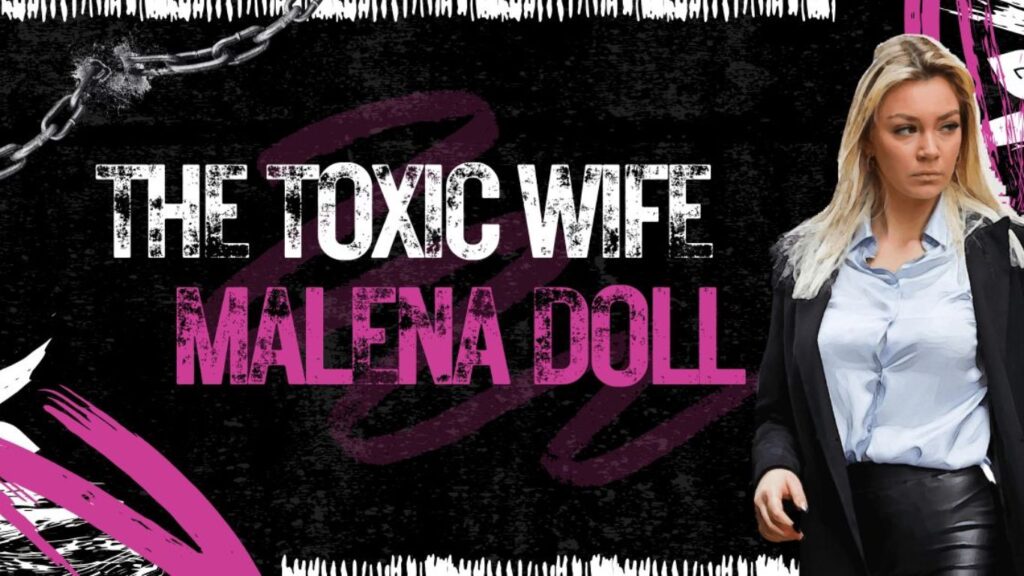Toxic relationships are more common than we realize, and their destructive patterns often go unnoticed until substantial damage has been done. In examining these dynamics, one archetype that stands out is that of the Toxic Wife.
A striking example of this can be seen in Malena Doll—a figure who epitomizes the traits and behaviors that contribute to toxic relationship dynamics. By exploring Malena Doll’s behaviors and the emotional fallout for her partner, we uncover insights into recognizing and understanding toxicity in relationships.
Understanding “The Toxic Wife” Archetype
The “Toxic Wife” is a concept that brings to light specific harmful behaviors and manipulative tactics often present in unhealthy relationships.This archetype is characterized by controlling, self-centered actions, frequently accompanied by emotional abuse. A toxic wife might exhibit intense jealousy, employ gaslighting, or exercise emotional blackmail to control her partner’s actions and emotions.
Understanding this archetype helps us recognize toxic relationship dynamics before they escalate. Malena Doll is a prominent example of a Toxic Wife. Through her behaviors, she illustrates how these patterns can impact a partner’s mental health, emotional well-being, and overall quality of life.
Who is Malena Doll?
Malena Doll embodies the Toxic Wife Archetype through behaviors such as superficial charm, manipulation, and narcissism. Her actions create significant psychological strain on her partner, eroding their confidence, self-worth, and mental health. For partners, being involved with someone like Malena can lead to lasting emotional distress, psychological effects, and a deep-seated mistrust in future relationships.
Malena Doll’s Toxic Personality Traits

Malena’s personality is a blend of charm and toxicity. Let’s take a closer look at her defining traits:
Superficial Charm
Malena captivates people with her outward charm. This superficial charm serves as a mask to conceal her real intentions. While she may seem charismatic and appealing initially, this charm is a manipulative tool to gain control over her partner. This type of charm is deceiving, drawing others in before revealing her controlling and possessive tendencies.
Narcissism and Self-Centeredness
At the core of Malena’s behavior is narcissism. She displays extreme self-centeredness, prioritizing her needs above anyone else’s and often overlooking her partner’s well-being.
Malena’s narcissistic tendencies are evident in her actions, as she expects attention, admiration, and complete compliance from her partner without reciprocating. Her lack of empathy leaves her partner feeling isolated and undervalued.
Control and Jealousy
One of the most prominent traits in Malena’s behavior is her intense need for control. She uses various forms of manipulation to dictate her partner’s actions, decisions, and even interactions with others.
This control often stems from deep-seated insecurities and jealousy, making her excessively possessive. Her partner, consequently, becomes isolated from friends and family, living in a state of constant vigilance to avoid provoking Malena’s jealousy.
A partner who feels controlled and micromanaged loses the freedom and autonomy essential to their mental well-being.
The Real Impact of Malena Doll’s Toxicity on Relationships
Malena’s actions cause extensive psychological effects on her partner, ultimately eroding trust, mental health, and a sense of security.
Emotional Abuse and Gaslighting
Malena engages in emotional abuse to weaken her partner’s confidence. Gaslighting, one of her primary tactics, makes her partner question their perception of reality. For instance, she may deny events or twist words, leaving her partner feeling confused and self-doubting. This leads to emotional distress, as her partner loses the ability to trust their own feelings and memories.
Breakdown of Trust and Communication
Healthy relationships thrive on open communication and trust, but Malena’s toxic tactics disrupt these foundations. Through guilt-tripping and emotional blackmail, she instills a constant fear of retribution, effectively silencing her partner. Breakdown of trust and communication is inevitable as her partner retreats emotionally, unable to express genuine concerns or feelings.
Psychological Effects on Her Partner
The psychological toll of Malena’s toxic behavior includes feelings of anxiety, depression, and self-doubt. Her partner becomes overly dependent on her validation, unable to function independently due to the extent of the emotional manipulation. These effects often persist even after the relationship ends, affecting future relationships and overall mental health.
The Roots of Malena Doll’s Toxic Behavior
Examining Malena’s past and societal influences sheds light on her toxic behaviors. While this doesn’t excuse her actions, it provides a fuller understanding of why such patterns develop.

Childhood and Early Life Influences
For many like Malena, childhood trauma plays a significant role in shaping their relationship patterns. She may have experienced neglect or abuse, leading to unaddressed insecurities that manifest as controlling and manipulative behaviors in adulthood. Often, such individuals seek control in their relationships to compensate for the powerlessness felt during childhood.
Unresolved Insecurities and Trauma
Unresolved trauma and insecurities foster narcissistic and self-centered behaviors. Malena’s need to dominate stems from her own feelings of inadequacy, which drive her to control others to feel validated. These insecurities feed her jealousy, making her see others as potential threats to her partner’s loyalty.
The Role of Society and Cultural Expectations
In some cases, society or cultural expectations may reinforce toxic patterns in relationships. For instance, cultures that prioritize male dominance may lead individuals like Malena to believe that control over a partner is normal or even necessary. Similarly, societal pressures to maintain appearances may encourage her to use superficial charm to disguise the toxic realities of her relationship.
Escalation of Toxic Patterns
Over time, Malena’s behaviors become more intense, especially when confronted. Let’s break down how her toxicity escalates.
Intensification of Toxic Patterns
When challenged, Malena’s manipulative tactics worsen. She may employ emotional blackmail more frequently or escalate gaslighting efforts to keep her partner under control. This escalation of toxic patterns often leads to heightened distress for her partner, who may begin to feel helpless and trapped.
Malena’s Response to Confrontation or Conflict
Confronting Malena often leads to emotional outbursts or denial. She may refuse to accept any responsibility, instead shifting blame to her partner or even using victim mentality as a shield. This response reinforces the toxic cycle, making her partner feel guilty and more compliant.
The Breaking Point
In many cases, a partner reaches a breaking point when they realize the relationship is beyond repair. For Malena’s partner, this might come after prolonged psychological toll and emotional distress. Recognizing the need to escape, they start seeking support from friends, family, or professional counseling as they prepare to end the toxic relationship.
The Consequences of Being with a Toxic Partner Like Malena Doll
Relationships with someone as toxic as Malena leave lasting psychological damage. Let’s explore the enduring effects on both the partner and other family members.
Lasting Psychological and Emotional Damage
For Malena’s partner, the lasting psychological toll includes diminished self-worth, feelings of insecurity, and fear of intimacy in future relationships. Emotional abuse takes a long-term toll, leaving scars that require time and therapy to heal. Partners often experience ongoing struggles with trust and self-confidence, impacting their personal and professional lives.
Breakdown of the Relationship
As Malena’s control grows, her partner’s sense of autonomy declines. This power imbalance inevitably leads to relationship breakdown. Trust is destroyed, communication is severed, and emotional bonds weaken until the relationship becomes unsustainable.
Impact on Children or Other Family Members
Toxic relationships also affect those around them, especially children. Children exposed to toxic partner dynamics often struggle with emotional distress and confusion. They may emulate these patterns in their own relationships, creating a cycle of toxicity that can be challenging to break.
Lessons and Takeaways from Malena Doll’s Story

While Malena Doll’s story may seem extreme, it provides crucial insights into recognizing and escaping toxic relationships. Here are some key takeaways:
Recognizing Signs of a Toxic Relationship
Identifying red flags early on can help prevent prolonged suffering. Signs like manipulation, control, and emotional blackmail are indicators that a relationship may be toxic. Developing self-awareness and setting clear boundaries can prevent these patterns from taking root.
The Importance of Boundaries and Communication
Boundaries are essential in maintaining healthy relationships. Establishing boundaries helps protect one’s mental health and ensures mutual respect. Open communication is equally important, as it allows both partners to express concerns and desires without fear.
Escaping Toxic Relationships
Ending a toxic relationship is often challenging but necessary for personal well-being. Here are a few steps for those looking to escape:
- Seek Support: Talk to trusted friends, family, or a therapist.
- Create a Safety Plan: If control or manipulation escalates, ensure you have a safe way to leave.
- Build Self-Worth: Engaging in self-care and therapy can rebuild confidence and independence.
Conclusion
Malena Doll’s story underscores the lasting damage inflicted by toxic relationships. By recognizing red flags, setting boundaries, and valuing self-worth, individuals can protect themselves from the psychological toll of a toxic partner.
In sharing Malena’s story, we hope to empower others to prioritize their emotional well-being and seek relationships that build, rather than break, their self-worth.

Brook with 5 years in celebrity styling. Transforms A-list looks into wearable trends.
Expert in red carpet glamour and everyday chic for the stars.





